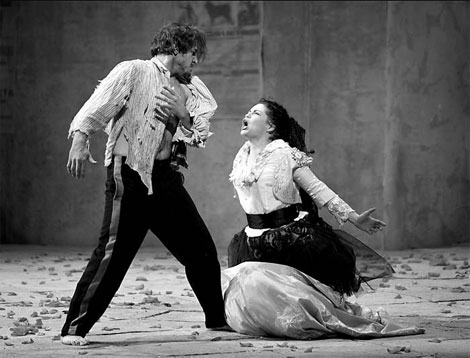Opera for the masses
The second annual opera festival is looking to build on the success of the first and introduce the power and the glory of some of opera's best loved works to a wider audience.
 |
|
A stage scene of Carmen, a production of the National Center for the Performing Arts. [China Daily] |
Sensual choreography, powerful music, fabulous costumes, and impressive visual effects created a feast for the senses with the opera Carmen, Thursday night at the National Center for the Performing Arts (NCPA).
"The reason I make such a stylish, period production is because I want to make something really big that will appeal to every one, not just people who know opera," 54-year-old American director Francesca Zambello tells China Daily during a rehearsal.
"I really hope the audience responds to the art form of opera. I think this is one of the best opportunities to discover opera, this is the opera that has something for every body. Forget anything psychological, just from the point of view of a fantastic show," she says.
Zambello's Carmen perfectly encapsulates what Chen Ping, NCPA's president, is trying to achieve with the annual opera festival that launched last year.
"Though Western-style opera was introduced to China more than 60 years ago, it still remains detached from people's lives. It's really hard to market an opera in a place where not many people appreciate the art form, let alone a festival featuring several productions," says Chen, "But we decided to accept the challenge."
Last year's performances of Rigoletto by Italy's Teatro Regio di Parma and Madam Butterfly by Teatro La Fenice received wide acclaim and standing ovations.
Though cultural life in the capital has flourished in recent years and many Western opera productions have toured Beijing, opera is still viewed as a high-brow social event.
"While it appeals to the rich as an elite social event, the NCPA is a theater for the people, so we are trying to introduce opera to a wider audience, especially new audiences," Chen says.
To attract a more diverse audience, NCPA's opera festival presents both popular classical Western operas and Western-styled Chinese operas whose stories, content and emotions are more relevant to Chinese audience.
The program of NCPA's First Opera Festival last year included Carmen, Rigoletto, Turandot, Madame Butterfly, Tosca and La Bohemia.
Chen believes that one reason more Chinese people do not appreciate Western operas is because in the 1980s and 1990s some Western operas were translated into Chinese and performed by Chinese artists. The arias always sounded awkward especially as there was few high-quality Chinese vocalists in the art form and the translations had difficulty conveying the original flavor.
This year, aside from foreign productions such as Bolshio Theatre's Eugene Onegin and Teatro Regio di Parma's Rigoletto, NCPA has invested considerable effort and of course money commissioning its own opera productions with international directors and casts including Carmen, Verdi's La Traviata, Donizetti's L'Elisir D'Amore (The Elixir of Love) and Puccini's Gianni Schicchi.
Carmen which will run to Monday, is the product of an international team including the American director Zambello, whose Carmen for London's Royal Opera House in 2006 and 2008 won wide acclaim, and the American choreographer Duncan Macfarland, set designer Peter Davison, costume designer Susan Willmington and lighting designer Benjamin Pearcy, who worked on international sensation Riverdance, all are from the UK and experienced in opera and musicals.
"Carmen is a very powerful story. I have directed it a numbers of times in my career but never tire of it. Why do we want to see Romeo and Juliet again and again and again? Because it speaks to us, it mirrors the world," says the veteran director.
"For the NCPA production," she adds, "I really wanted it to be as true as possible to the original story and presented in the most dramatic and passionate way possible," she says.
Zambello says her experience in Beijing has been immensely enjoyable and she has enjoyed working with an international team especially the Chinese artists.
"In rehearsals, we communicate much better than politicians. For me it's exciting to understand Chinese culture and personalities in very different way to what I knew in the US through those ABCs. Here I try to figure out how does a Chinese person interpret Carmen, what does the story mean to him? You cannot just put the costume on someone," she explains.
The director also says she is jealous that China has so many new theaters.
"It's important to me to make people go to the theater, to experience something live, because something live is different to anything else. A theater is like a temple, there is a connection between audience and stage," she says.
 0
0 






